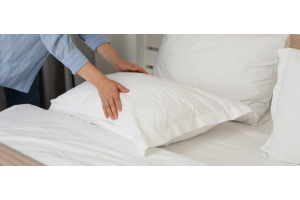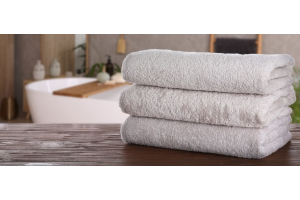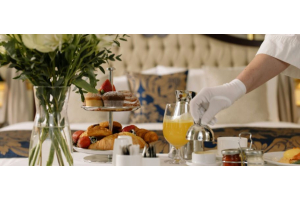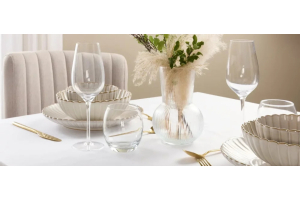We use cookies to give you the best possible experience. To accept cookies continue browsing, or view our Cookies Policy to find out more.
Textile Fact or Fiction? Egyptian Cotton Explained

With so many different types of cotton on the market, choosing the very best hotel bedding and bed linen can prove more difficult than you first thought. Many people decide to go straight for the sheets labelled ‘100% Egyptian cotton’ without fully understanding what it actually is or whether the claim is genuine. Others avoid Egyptian cotton products altogether, viewing the term as just another industry buzzword used to mask lower quality products.
So what exactly is Egyptian cotton – textile fact or fiction? You’ll be pleased to know that Egyptian cotton is in-fact one of the most luxurious and hardwearing materials on the market, you just need to know a little about its background and be aware of what to look for when making a purchase to ensure that you’re treating your guests to the real thing.
So What Exactly is Egyptian Cotton?
Genuine Egyptian cotton is quite a unique type of cotton. Rather than simply being grown, manufactured or sold in Egypt, it’s grown solely in one specific place – the moderate climate and fertile soils of the country’s Nile delta. Its scientific name is gossypium barbadense, also known as extra long staple cotton.
Growing conditions here are so perfect that the cotton has evolved to develop a longer fibre staple, a great asset that means the thread produced from the fibres will be thinner than other kinds of cotton, in turn resulting in sumptuous, higher thread count end-products. Egyptian cotton bolls are even delicately handpicked to this day so they retain their soft quality.
The benefits of Egyptian cotton linens
Egyptian cotton products might cost a bit more than, say, your bog standard cotton duvet cover, but the quality you’ll receive in return is fantastic.
As well as being incredibly durable and gloriously soft, Egyptian cotton bed linen is less likely to produce lint or pilling, becomes softer with age and washing and is much, much lighter than short staple cottons. This means it’s refreshingly breathable during hot summer months and – with many thread counts coming in above the 600 mark – still insulating during winter. Just imagine how fantastic your guests will feel after sleeping soundly under such soothing sheets.
Egyptian cotton bedding can greatly benefit guest house owners too. Due to their great propensity to take in water, coloured sheets made from Egyptian cotton will maintain their vibrancy when cleaned and not leave your guestrooms looking washed out.
However, it’s also worth remembering that Egyptian cotton owes its durability and quality to the long staple length of the cotton fibre, meaning that cotton products that aren’t made of Egyptian cotton but still possess this luxurious asset are of just as high a quality, and can often cost less to purchase:
- Turkish cotton carries this same long staple length that makes the products feel so soft and luxurious. Although less absorbent than Egyptian cotton, Turkish cotton makes for great bath towels that dry faster, avoid retaining moisture in humid environments and are kind to your skin. Find out more about the benefits of Turkish cotton towels.
- High end, 100% cotton products are manufactured using long staple Indian cotton. Although not all Indian cottons are of this quality, we strive to source long staple plants that result in luxurious, hardwearing linens.
What to look out for when buying
You’d be forgiven for wanting to run straight out to buy some Egyptian cotton bedding after reading this post. After all, who wouldn’t want to inject a bit of luxury into their hotel, B&B or guest house?
This is just the notion to bear in mind when looking to make a purchase. Manufacturers who want to make a quick profit often label lower quality sheets as Egyptian cotton products, purely because the cotton was produced or sold somewhere in Egypt. However, there are things you can look out for to ensure you’re buying into the real deal or into another type of genuine, long staple length cotton:
- A product that’s ‘100% cotton’ as blends are of a much lower quality, no matter how much the percentage of Egyptian, Turkish or other long staple cotton may be.
- A thread count of 300 or above to ensure a really comfortable, luxurious feeling product.
- A higher price. Like it or not, cheap sheets are probably cheaply made.
- The Egyptian cotton trademark, which is recognisable as a white cotton plant inside a dark triangle that symbolises an Egyptian pyramid.
- Really soft fabric. Sometimes there’s no substitute for just feeling the product before you buy it.
Although there are a few bad apples who use it as a tactical piece of jargon to dress up generic products, it is in-fact a top quality fabric that isn’t confined to bed linen. Egyptian cotton sheets, Egyptian cotton bath towels, Egyptian cotton duvet covers and more now populate both the tangible and online shelves of credible retailers and, when utilised in your own hospitality establishment, will make any guest feel like they’re staying at a five-star hotel.
But this doesn’t mean you should forget about non-Egyptian cottons too. Although the mantle of Egyptian cotton earns major kudos for brands, many Turkish cotton and higher end 100% cotton products still retain this long staple quality and, therefore, all the luxury and longevity of Egyptian cotton.






